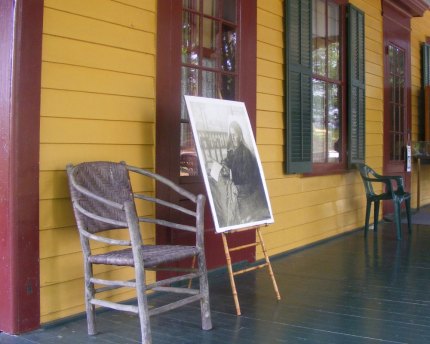Ulysses Grant's views on slavery examined

A photo of U.S. Grant on the porch of his final home in New York.
Protestors in San Francisco last month toppled a statue of Grant in Golden Gate Park. It was one of several monuments targeted across the country as racial justice activists seek to rid public squares of statues paying homage to slaveholders. For the most part, the focus has been on Southerners who fought for the Confederacy during the Civil War. Prominent examples include Gen. Robert E. Lee, commander of the Army of Northern Virginia, and Jefferson Davis, president of the Confederate States of America.
So, why are protestors questioning Grant's record? Here is the rundown:
Early life: Born in Ohio, Grant was the son of Jesse Root Grant, an abolitionist "who taught his son that slavery was cruel and immoral," according to Sarah Fling, history fellow, writing on the White House Historical Association website.
When young Ulysses was coming of age, his father applied for an appointment for his son to be admitted to West Point. Grant graduated in 1843. Five years later, he married Julia Dent, the sister of a West Point friend who was from a slave-owning family.
After college: Grant fought under Gen. Zachary Taylor during the Mexican War. He resigned from the Army April 11, 1854, after an assignment to Fort Humboldt, California, described on the Encyclopedia Britannica website as "a dreary post with an unpleasant commanding officer."
From there, he settled in White Haven, the estate of his wife's family in Missouri. Julia Dent Grant had four slaves, two male and two female, writes Geoffrey Perret in the book, Ulysses S. Grant: Soldier and President (Random House; 1997). Grant "told his wife's slaves that it was his ambition to give all of them their freedom 'as soon as I am able.'" Julia Grant tried to get her husband to punish the slaves, according to Perret, but Grant refused.
In 1859, Grant freed a slave, William Jones. "A male slave in good health was worth about fifteen hundred dollars," Perret writes, "and Grant was financially hard pressed... It was an unspoken declaration of how he felt about slavery."
The American Civil War Museum's website points out, "It is notable that Grant did not sell or work out a plan with Jones to purchase his freedom, but simply freed him."
Even so, historians debate whether Grant was opposed to slavery all of his life or whether his views evolved. In 1863, Grant wrote this to a friend: “I never was an abolitionist, not even what could be called anti-slavery but I try to judge fairly and honestly and it become patent to my mind early in the rebellion that the North and South could never live at peace with each other except as one nation, and that without slavery. As anxious as I am to see peace established, I would not therefore be willing to see any settlement until the question is forever settled.”
As president: As president, "he opposed the rise of white supremacist groups in the South, like the Ku Klux Klan, and sent federal troops into the region to combat racism and curb violence," according to the White House Historical Association website.
Resources:
- The American Civil War Museum: Myths & Misunderstandings, Grant as a slaveholder, by Sean Kane, Nov. 21, 2017.
- CBS, 5 KPIX, SF Bay Area: Photos -- Juneteenth Protesters Topple Golden Gate Park Statues Of Serra, Key, Grant, June 20, 2020.
- Encyclopedia Britannica: Ulysses S. Grant, by John W. Simon.
- National Park Service: Slavery at White Haven, Ulysses S. Grant National Historic Site.
- Ulysses S. Grant, Soldier and President, by Geoffrey Perret, (Random House; 1997).
- University of Virginia Miller Center: Ulysses S. Grant -- Life before the presidency, by Joan Waugh.
- White House.gov: Ulysses S. Grant.
- White House Historical Association:The formerly enslaved household of the Grant family, by Sarah Fling.
Related:
Ranking the presidents, best to worst
Like us on Facebook and tell us what you think.

